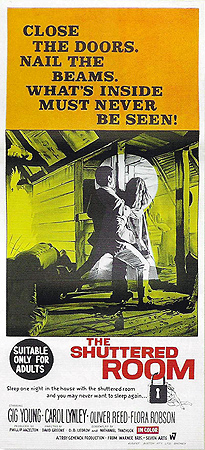Monday, July 4, 2011
Movie vs. Book: The Shuttered Room
MOVIE: "The Shuttered Room" (1967)
"The Shuttered Room" (aka "Blood Island") was based off a book by August Derleth and H.P. Lovecraft. The movie bears no resemblance to anything Lovecraftian. That’s not to say the movie was bad. It wasn’t. In fact, it was a fun ride.
"The Shuttered Room" centers around young Susannah Whatley-Keaton who, married and having just turned twenty-one, inherits the old mill house she grew up in off the New England coast. She and her husband travel to the small island community to take a look around. The only thing is…there is something evil living in that house. Something horrible that makes her aunt warn her to stay away, turn around and go home. But it’s not the thing in the house that Susannah and her husband need to worry about most; the menacing redneck townsfolk seem more dangerous than the family curse (think Straw Dogs). Is there really a demon living inside the house, or is it the townsfolk’s’ way of tormenting the “city folk”?
Made in 1967, this movie is so very much a product of the era. The camerawork uses a lot of the tweaked angles popular in the day. The music just barely walks the edge of atmospheric, with a toe in the psychedelic. Oddly, the director, David Greene, went on to direct "Godspell" (1973) a few years later. It does seem to fit.
Dated or not, the movie was quite fun. From the opening sequence of a young child and her parents being tormented by an unseen creature in the mill house, the pacing does not let up. Even though it takes over an hour for the first dead body to show up, it keeps you on the edge of your seat without letting you get bored, even during the exposition.
The performances were pretty good, too, especially Oliver Reed as the head baddie. In the 60s and 70s, quite a bit of Reed’s career came from playing either bad guys or guys only partially leaning bad. In the case of The Shuttered Room, he seems to relish the pure sinister qualities of his character, and that makes him fun to watch even as you root for his demise.
However, if you’re expecting something Lovecraftian, you will be disappointed in the movie. There are not a lot of quiet unnerving chills, nor are there any elder gods. It stays more along the lines of a Hammer film, where the horrors are punctuated either by creative camera use, musical cues or maniacal performances.
All in all, as its own movie, I definitely recommend "The Shuttered Room". Granted, I haven’t read the story so I’m not sure if it’s loyal or not (somehow I’m guessing it isn’t). But on its own, it’s a lot of fun.
-- Jen
BOOK: The Shuttered Room by August Derleth and H.P. Lovecraft (1959)
This short novella contains everything that Derleth's fans love about his posthumous "collaborations" with Lovecraft, and much of what his detractors hate about them. It is not as overt about his categorization of the Lovecraftian deities as many of his other stories, but it does add to the Mythos a level of order which is typically only tangentially approached in the original stories.
Specifically, this story serves as a sequel to two of Lovecraft's stories, The Dunwich Horror and The Shadow Over Innsmouth. Where it succeeds for me is that, while it sticks with Derleth's favorite Lovecraftian tropes (much of the plot being explained through passages from books or articles, italics at the end of the story... while HPL used these devices, it seems that they dominate the bulk of Derleth's most memorable Mythos stories) it does not lean upon them for the entire punch of the story. Instead, there are moments of activity by the protagonist and the backstory content is there merely to establish the connection to the two earlier tales.
When Derleth was focusing more on storytelling and less on imitation, he could produce wonderful pieces. His Solar Pons work and his Mythos pieces both produced some true gems, but his efforts to shoehorn the Mythos into alchemical constraints and traditional notions of good and evil have earned him deep enmity from many Lovecraftean fans. I don't share their view; instead, I simply feel that if Derleth was free to riff off of other authors' work without conveying their full intent, I don't see why I have to measure Derleth's work in the context of the original work. To me, Derleth's Mythos is the horror version of alternate history fiction, and this is among the best of those pieces.
Four stars out of five.
--Bill


